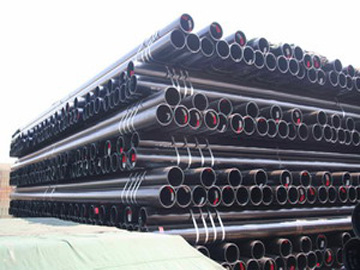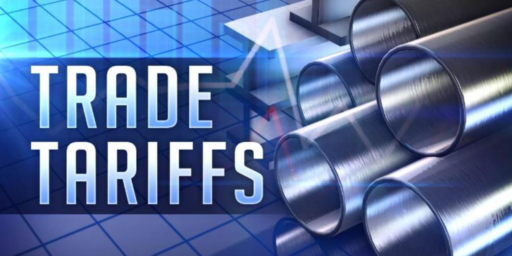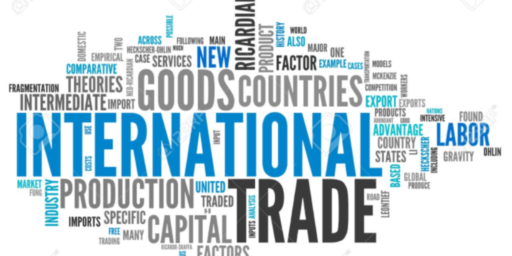Chinese Steel Faces Stiff Tariffs: Untangling the Web
 Apparently, Chinese Premier Wen Jiabao had reason to be concerned about Western protectionism when he made his remarks last week. The U. S. has imposed stiff duties on imports of steel pipe from China:
Apparently, Chinese Premier Wen Jiabao had reason to be concerned about Western protectionism when he made his remarks last week. The U. S. has imposed stiff duties on imports of steel pipe from China:
(Bloomberg) — The U.S. will impose duties on $2.8 billion in steel-pipe imports from China after saying subsidies on the products may harm American steelmakers, a move that threatens to escalate trade tensions between the two countries.
The U.S. International Trade Commission voted 6-0 today in Washington. The Commerce Department set duties in November ranging from 10.4 percent to 15.8 percent, subject to the ITC’s ruling, on Chinese pipes used in oil wells. A preliminary ruling by the ITC in May led Chinese producers to halt exports to the U.S., state-owned Tianjin Pipe Group Corp. has said.
The tariffs are being imposed under the terms of the agreement that China made when joining the WTO which allowed other countries to impose tariffs on Chinese goods legally, unilaterally, and without recourse if the goods were found to cause substantial dislocation in a domestic industry. This is the second time since taking office that the Obama Administration has used this provision to impose tariffs on Chinese imports, the first time being on tires imported from China.
I think that this move requires a certain amount of untangling. Jurists may ask is it legal? It apparently is. Economists may ask is it beneficial? That depends on whether you’re a U. S. producer of steel pipe or a consumer of steel pipe as the Wall Street Journal hastens to remind us:
The reality is that the domestic steel industry produces about two-thirds of what the U.S. consumes each year. The rest comes from foreign suppliers, and the competition results in products that would otherwise be more expensive. China is by far the world’s leading producer of drill pipes, and a Goldman Sachs analysis last month that anticipated the ITC decision says that it could result in a shortage of the pipes in the U.S. by the second half of next year. Never mind that making domestic gas-and-oil exploration more expensive would seem to be at cross purposes with making the U.S. less reliant on foreign energy.
By the way, the U.S. steel industry also made a fat profit of $3.9 billion from 2006 to 2008. China will no doubt respond to this latest protectionism with more tariffs of its own against U.S. products or investment, further increasing the cost of this protectionism.
U.S. trade laws aren’t about “fair trade” or “leveling the playing field,” or the other cliches of protectionists. They have become tools of political income redistribution, protecting certain industries at the expense of others and the larger U.S. economy.
A politician may ask is it popular? There are a lot more U. S. consumers who are likely to be injured by this move than there are domestic U. S. producers who are likely to be helped.l However, the producers will know that they’re being helped while the consumers are significantly less likely to realize that they’re being hurt.
Is this protectionism? It absolutely is. Is it justified? That’s a question so impossible to untangle that I’m afraid it’s beyond my powers. So many countries including China, South Korea, Japan, and India have been subsidizing their own domestic steel industries via tariffs, quotas, and direct subsidies for so long that at this point it’s impossible to disaggregate their competitive advantages from the results of government subsidy.
And the WSJ is correct to suggest that this move is likely to increase the cost of steel in the U. S. even more broadly than just among the manufacturers of steel pipe. That’s a puzzling move at a point at which the U. S. taxpayers via their government is moving to increase their stake in the U. S. auto industry, among the largest consumers of steel.
The foreign policy scholar may well ask is it good policy? It is well known that free trade benefits the trading partner with freer trade. However, that finding is dependent on comparative advantage. Whether imposing tariffs on Chinese steel pipe is a good policy here in the United States and now remains to be seen. Frankly, I doubt it.




I’m skeptical of this myself, but I’m surprised you didn’t at least consider the argument that consistently using the sticks allowed by the WTO might provide incentive for China free trade on its end.
I was planning on addressing that in a separate post. Honestly, I don’t think that view stands up to scrutiny but you’re right, it does bear consideration.
I’m with you prima facie, but I do wonder if employed properly it could work.
“So many countries including China, South Korea, Japan, and India have been subsidizing their own domestic steel industries via tariffs, quotas, and direct subsidies for so long that at this point it’s impossible to disaggregate their competitive advantages from the results of government subsidy.”
Indeed. I remember as we were perfecting the production techniques for ulta-low sulfur OCTG in the 80’s that the biggest fear was Japanese subsidy. Who would we sell it to?
An interesting aside. Also many moons ago I had a business relationship with a Nucor-like mini called Birmingham Steel. Their goal was to drive their per ton labor cost to a point it was less than the cost for foreign steel to ship in. Sorta settles the argument on subsidy.
And the did it.